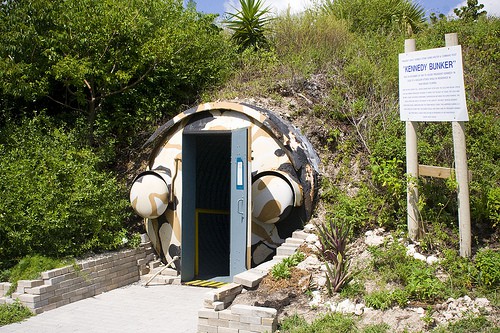A little piece of history, but few tourists and historians know during the Cuban Missile Crisis.
Secret Kennedy Bunker on Peanut Island: Hidden treasure, historic site
~Hidden on an island best known for boats and bikinis is a fascinating relic of another era in South Florida — the Kennedy Bunker, the underground fallout shelter built in December 1961 as a safe haven for President John F. Kennedy, whose family’s Palm Beach compound is minutes away across the water.
The bunker was constructed quickly and secretly during the run up to the Cuban Missile Crisis. Hidden in the woods and underground, it fell into disrepair until restored by the museum in 1999.
The bunker is located on Peanut Island, a Palm Beach County park accessible only by boat, that is usually surrounded by partiers on boats.
The bunker is operated by the Palm Beach Maritime Museum, which also runs the adjacent Historic Former Coast Guard Station museum.
The bunker is the real deal. The museums site says:
“With the exception of a presidential seal, added as a modern enhancement, the declassified, decommissioned bunker is very close to the original. The structure is covered with earth and many layers of concrete and rebar. Entry is via a blast-hardened tunnel, with a 90 degree angle to minimize shock effects from a nuclear explosion. Entry is through a secure decontamination area, which was, however, and interestingly, made of plywood.”
While a few folks around Palm Beach County know about the Kennedy Bunker and Peanut Island, it still ranks as one of Florida’s hidden treasures. It’s likely to stay that way, however: Since it is located on an island, visiting it will always require taking a water taxi, private boat or a kayak — which is part of why we love it in the first place.
The bunker itself is quite small. Shelves are stocked with containers of drinking water, Army K-rations and gas masks. There’s a rocking chair — the seat of choice for a president with a bad back, and a ham radio reminds us of life before cell phones.
It’s a spooky space. You know that if this bunker were ever actually used, it would be something close to the end of the world.
More practical matters, however, are also discussed. There is no bathroom. How would that work?
The answer: You used a bucket, filled it and sealed it.
Before touring the bunker, visitors are taken through the historic Coast Guard Station. The tour is short and modest, but you see some interesting items.
An interesting piece in the New York Times tells how JFK had a similar shelter built on another vacation destination, Nantucket Island. That shelter has never been open to the public.
More from Reuters on Peanut Island:
Getting to the fallout shelter’s main living quarters required passing through a series of narrow passages that held a generator, air pumps and filters, a radiation detector and a sterilization chamber.
At the back of the largest room was an emergency escape hatch that led to a helipad in case the shelter itself came under attack. The U.S. government did not acknowledge its existence until 1974.
The island where it sits was dredged up from the Palm Beach inlet in 1918 to serve as a port for peanut oil shipping.
Although that business failed, the name of Peanut Island remained. It was closed to the public from the time the Coast Guard took it over in 1936 in preparation for World War Two until 1995, when the museum secured a 45-year lease on the property.
At the time, the shelter was partially flooded and in disrepair, Miller said. Nearly all of its contents had been removed or destroyed.
The museum opened to the public in 1999, and efforts continue to restore the bunker to its original condition.
The steel hatch that leads to a dark, downward sloping steel tube was once hidden from sight by a thicket of trees. Miller said he planned to replant the trees, which for visitors will recreate the dramatic effect of stumbling upon the entrance in a small hill.
Despite the long-lasting interest in the Kennedys and their fairy-tale image, maintaining the shelter remains a challenge. It sees about 12,000 visitors annually and relies on volunteer efforts to help with maintenance.
It receives no financial contributions from the federal government or the Kennedy family, even though Ethel Kennedy, the widow of slain former Attorney General Robert F. Kennedy, visits the bunker almost every year with her grandchildren.








![The five leaders of BRICS met in Ufa, Russia on 9 July 2015 [Xinhua]](https://thebricspost.com/wp-content/uploads/2015/07/243968990_8-e1436462738402.jpg)
![Refugees are prevented by police from entering the Keleti railway station in Budapest, Hungary on September 1, 2015 [Xinhua]](https://thebricspost.com/wp-content/uploads/2015/09/246439412_8.jpg)